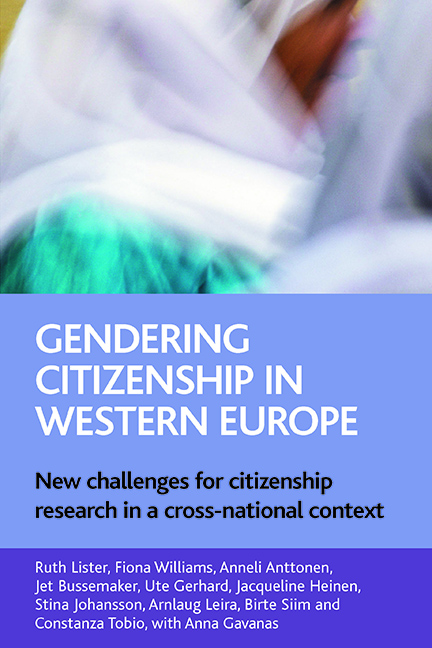 Gendering Citizenship in Western Europe
Gendering Citizenship in Western Europe Published online by Cambridge University Press: 15 September 2022
Introduction
As context matters, a cross-national European study of the meanings of the concept of citizenship must, first of all, take the distinctive historical backgrounds into account. Understandings of citizenship have not only changed over the course of time, but its multifaceted, different meanings also reflect both varied political and social histories and legal traditions and cultures in the respective European countries. When, in this chapter, special attention is paid to legal traditions and cultures as characteristic of particular trajectories of development, this is not intended as a reduction to a legal discourse; on the contrary, it is an attempt to be concrete and extend our view of political ideas or conceptualisations to what is called ‘lived experience’. For the notion of ‘legal cultures’ comprises more than norms, doctrines or institutions of a legal system, it also includes attitudes towards the state and the practical experiences of those who were excluded from citizenship rights or became involved with the law. Since citizenship is not only a legal status but also a practice and lived experience (Lister, 2003), the awareness of the significance of legal cultures, therefore, may contribute to an understanding of ‘citizenship regimes’ as ‘historical constructions’ (Jenson and Phillips, 2001) and may explain specific barriers to equal citizenship or particular trajectories of inclusion respectively. These legacies, different historical roots and legal cultures, political struggles as well as particular institutional trajectories, still shape today's discourses and have an impact on citizenship theory and practice. Of special interest are the ‘overlapping vocabularies’ of the different discourses and debates with respect to female citizenship that impeded the possibility of gender equality (Landes, 1996). This means that the history of women's citizenship has deviated from the development usually depicted in the traditional citizenship literature.
In this chapter, however, the attempt at exploring the different historical and political contexts cannot be complete; it must be restricted to an exemplary or ideal type of argumentation. Since ideal types are always theoretical exaggerations, which in reality never exist in pure form, they will be illustrated by exemplary historical features. After introducing the terminology of the legal tradition and the models of the modern concept of citizenship, the second part of the chapter will discuss the delays and the impediments to women's citizenship in the different dimensions of political, civil and social citizenship rights.
To save this book to your Kindle, first ensure no-reply@cambridge.org is added to your Approved Personal Document E-mail List under your Personal Document Settings on the Manage Your Content and Devices page of your Amazon account. Then enter the ‘name’ part of your Kindle email address below. Find out more about saving to your Kindle.
Note you can select to save to either the @free.kindle.com or @kindle.com variations. ‘@free.kindle.com’ emails are free but can only be saved to your device when it is connected to wi-fi. ‘@kindle.com’ emails can be delivered even when you are not connected to wi-fi, but note that service fees apply.
Find out more about the Kindle Personal Document Service.
To save content items to your account, please confirm that you agree to abide by our usage policies. If this is the first time you use this feature, you will be asked to authorise Cambridge Core to connect with your account. Find out more about saving content to Dropbox.
To save content items to your account, please confirm that you agree to abide by our usage policies. If this is the first time you use this feature, you will be asked to authorise Cambridge Core to connect with your account. Find out more about saving content to Google Drive.